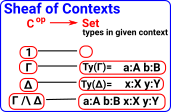There are rules for both definitionally equality and propositional equality
Rules for Definitionally Equality
The rules must be normalising so,
- All rules must reduce the expression in some way as the rules are applied automatically and there must be no possibility of a loop where rules get applied indefinitely.
- The evaluation of an expression containing only literal values will give a value.
- There may also be rules for expressions containing variables as long as these rules are sure to terminate but these rules may be more ad hoc. For example, in Idris function parameters that are not case-split may be reduced.
As an example, a rule for symmetry x=y -> y=x can't be a definitionally equality rule and so must be a propositional equality rule because:
- It may not be necessary.
- If applied automatically it would be called indefinately.
Rules for Propositional Equality
The rules are used to prove equality so its harder to have some automatic algorithm and so the programmer needs to apply the rules as required to do the proof.
Substitution
There seems to be at least 2 sorts of rules we can apply to equations:
- Change variable to another variable or expression (provided we do it consistently everywhere it occurs, including in types and in context)
- Replace like for like.
If we substitute, in a term M all occurrences of |
|
example where:
|
 |
Substitution happens in function application (that is, when deconstructing a function. See β-reduction in λ-calulus. |
(λ x:σ.N) M |
Definition of 'subst'.
subst takes T x to T y.
We can think of T x as being an expression in x. So subst takes an expression in x to an expression in y.
|
 |
Below is the computational rule where the two values are already definitionaly equal. Here refl (propositional equality) is embedded into this definitionaly equality.
(subst (refl x x) T t) |
 |
Also we can replace like for like in equations (is this substitution?).
Rewriting in Logic
Rewriting an expression into a logically equivalent one.
example: ¬A /\ ¬B -> ¬(A \/ B)
Computation ruleRefl disappears when properties are definitionaly equal. |
|
| Substitution in Agda | id:{A: Set}->A->A
_==_:{A: Set}->A->A->Set
subst:{A: Set} (C:A->Set) {x y:A}->x==y->C x->C y |
subst : forall {x y} -> x == y -> x -> y
subst refl x = x |
| Substitution in Idris (replace) | ||| Perform substitution in a term according to some equality.
replace : {a:_} -> {x:_} -> {y:_} -> {P : a -> Type} -> x = y -> P x -> P y
replace Refl prf = prf |
Substitution as a fibration |
 |
| example |  |





